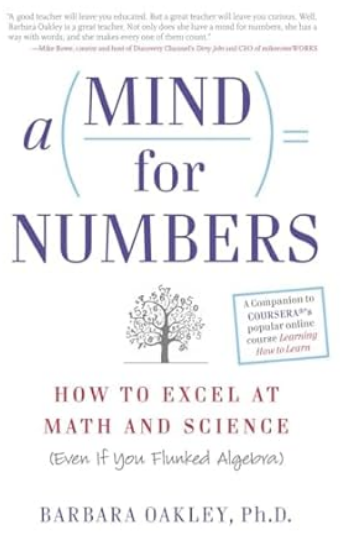Author: Barbara Oakley
Summary of “A Mind for Numbers” by Barbara Oakley
“A Mind for Numbers: How to Excel at Math and Science (Even If You Flunked Algebra)” by Barbara Oakley is a guide to improving your learning skills, particularly in math and science. Oakley, who struggled with these subjects herself, shares strategies and insights to help anyone become more proficient.
Key Concepts:
1. Active Learning:
- Active vs. Passive Learning: Active learning, such as teaching others or asking questions, is more effective than passive reading or listening.
- Focused and Diffuse Modes: The brain operates in two modes—focused (intense concentration) and diffuse (relaxed, creative thinking). Effective learning involves switching between these modes.
2. Chunking:
- Definition: Chunking is the process of grouping information into manageable units.
- Benefits: It helps free up working memory, making it easier to understand and retain complex information.
3. Procrastination and Memory:
- Procrastination: Techniques like the Pomodoro Technique (working in short, focused bursts) can help overcome procrastination.
- Memory Techniques: Spaced repetition and self-testing are crucial for long-term retention.
4. Einstellung Effect:
- Definition: This is a mental block that prevents seeing alternative solutions.
- Overcoming It: Taking breaks and approaching problems from different angles can help.
5. Metaphors and Analogies:
- Usage: Using metaphors and analogies can make complex concepts easier to understand.
Practical Tips:
- Practice Regularly: Consistent practice helps reinforce learning.
- Sleep and Exercise: Both are essential for cognitive function and memory consolidation.
- Mindset: Adopting a growth mindset, believing that abilities can be developed through effort, is crucial for success.
Review
“A Mind for Numbers” is highly regarded for its practical advice and relatable anecdotes. Oakley’s personal journey from struggling student to engineering professor adds credibility and inspiration. The book is praised for its clear, engaging writing style and actionable tips.
Pros:
- Accessible: The book is easy to understand, even for those without a strong background in math or science.
- Practical: Offers concrete strategies that can be applied immediately.
- Inspiring: Oakley’s story is motivating for anyone facing academic challenges.
Cons:
- Repetitive: Some readers find the content repetitive.
- Basic: Advanced learners might find the strategies too simplistic.
Overall, “A Mind for Numbers” is a valuable resource for anyone looking to improve their learning skills, particularly in math and science¹²³⁴⁵.
Source:
(1) A Mind for Numbers by Barbara Oakley – long form summary. https://www.reddit.com/r/BettermentBookClub/comments/xvtopq/a_mind_for_numbers_by_barbara_oakley_long_form/.
(2) A Mind for Numbers: How to Excel at Math and Science – Goodreads. https://www.goodreads.com/book/show/18693655-a-mind-for-numbers.
(3) A Mind For Numbers – Quick Summary – Unearned Wisdom. https://unearnedwisdom.com/a-mind-for-numbers-quick-summary/.
(4) A Mind For Numbers (Summary) – Book Review Archive. https://www.bookreviewarchive.com/a-mind-for-numbers-summary/.
(5) A Mind For Numbers Summary – Four Minute Books. https://fourminutebooks.com/a-mind-for-numbers-summary/.


Leave a Reply